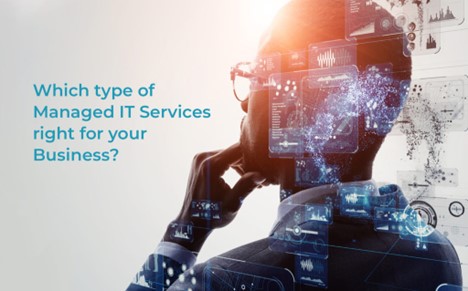
Co-Managed vs. Fully Managed IT Services
By Dave Warner, Systems Engineer at Cenetric
Large or small, most businesses will need IT help from time to time. From cybersecurity issues to a slow network to a laptop on the fritz, it’s worth it to have an expert’s help when you need it.
Even if you think your company is too small to need IT help, you probably do — cybersecurity concerns are enough reason all on their own to talk to an expert. (No company is too small to fall victim to bad actors, unfortunately.)
But who should you turn to? Should you have a dedicated IT staff member or should you outsource some or all of your IT services to a provider? If so, should you go with co-managed or fully managed services? The choices can be overwhelming, but we’re here to help you make sense of it all.
What are co-managed IT services?
Also known as shared services, co-managed IT services are when your IT department and a managed service provider work together to keep your tech in top form. Growing businesses often seek out a co-managed service provider when:
- They want their existing IT team to stay focused on strategic priorities for their company and need someone to handle day-to-day help desk issues and remote support.
- Their team is overwhelmed with an increasing workload and things are starting to slow down or slip.
- Their staff doesn’t have enough expertise in a particular area like cybersecurity or network design, and they need an outside expert to lead the effort.
A co-managed approach means your internal team will work with the provider on an ongoing basis to keep your IT strategies and practices in line with the goals of your business. They don’t replace your team — they enhance it.
It’s easy for a small or one-person IT team to become overloaded or stalled by everyday issues and lack the time to strategize for the future. A co-managed IT provider can support your team in staying on track.
What does a co-managed IT team look like?
Your company’s size usually dictates how much support you’ll need. A medium-sized company might do well with one desktop support engineer to make sure your employees stay productive with technology that’s up-to-date and working properly.
For larger organizations, several engineers and a technical manager might be the right fit. This would take the pressure of daily employee tech issues and questions off their shoulders so they can stay focused on high-level projects.

Benefits of co-managed IT services
When you work with a co-managed service provider, you get the best of both worlds: internal knowledge and outside expertise. Your IT team can focus on the projects where their experience brings the most value and let a co-managed provider handle tasks and projects that aren’t the best use of their time. You’ll get:
- A flexible partnership that can adjust to the changing needs of your organization
- The ability to update operations and add tasks as your organization grows
- A higher-functioning technology infrastructure that keeps your company performing at its best.
When you integrate your internal IT team with a co-managed service provider, you still have control over your infrastructure. They’ll just act as an extra resource for your in-house IT department for certain tasks or special projects.
For some businesses, co-managed IT support is the best of both worlds. You have an internal IT specialist who understands your specific industry, strategy and goals, and you get to work with someone on the outside with a different yet necessary set of skills. The more bases you have covered in your IT infrastructure, the less you’ll encounter issues.
What are fully managed IT services?
With a fully managed IT service, instead of having your IT team collaborate with a managed service provider, your MSP is in charge of your entire IT system. This is the best option for companies that don’t have an internal IT staff of their own but still want to make sure they’re productive and protected.
According to Datto’s Global 2024 State of the MSP Report, rapid changes in technology and how we work are driving businesses to seek the help of a managed service provider. Respondents’ top three reasons for using an MSP included:
- Increasing concerns about cybersecurity risks (54%)
- Need for more expertise than what they have internally (50%)
- Need help managing a hybrid or remote workforce (47%)
Outsourcing an IT service model means you don’t have to hire and manage an internal IT staff. In some cases, the managed IT service provider will operate 24/7, making your business more responsive to issues as they arise. The MSP’s trained professionals can even combat cybersecurity concerns like data breaches.
Examples of managed IT services include:
Benefits of fully managed IT services
A done-for-you approach to IT services takes a tremendous load off you and your team. We often find that in the absence of a trained IT professional on staff, many smaller companies rely on a team member who happens to be pretty good with technology. This person is usually overwhelmed with tasks and issues outside their scope of knowledge and distracted from the duties of their actual job.
But bringing a managed service provider into your business means you have access to a team of trained professionals who specialize in IT service and strategy. The stress of day-to-day and big-picture IT concerns is off your plate, leaving room for the work you and your team really excel at. An MSP will:
- Relieve you of IT responsibilities and headaches
- Execute a technology strategy that fits your business’s unique requirements
- Let your team focus on their work and be more productive
- Decrease costly downtime by keeping systems working effectively
- Help you stay compliant with industry regulations
- Protect the data of your company, employees and customers
- Guide your business to the most strategic and cost-effective technology solutions
Which type of IT service is right for your business?
The deciding factors between MSP vs. internal IT come down usually include your budget, your company’s size, specific industry needs and scalability.
Whether you choose co-managed IT support or fully managed IT services, the best IT service provider will make sure you always have access to a dedicated team of professionals who truly know your business and are responsive to issues large and small. They’ll be vendor-neutral so that you always get the right IT solutions for your business — not just the ones the MSP is partnered with.

Turn to Cenetric as your co-managed or fully managed IT service provider
Cenetric is a full-service IT firm that can help you with all your technology challenges, including network design and management, help desk services, and managed cloud support.
At Cenetric, your call will always be answered by someone with a minimum A+ certification and extensive customer experience training. Our clients get a live person on the phone immediately more than 99% of the time — and a response within 20 minutes if they don’t.
Looking for responsive, expert IT services for growing companies in Kansas City — or beyond? That’s Cenetric. Tell us about your challenges, and let’s figure them out together.
